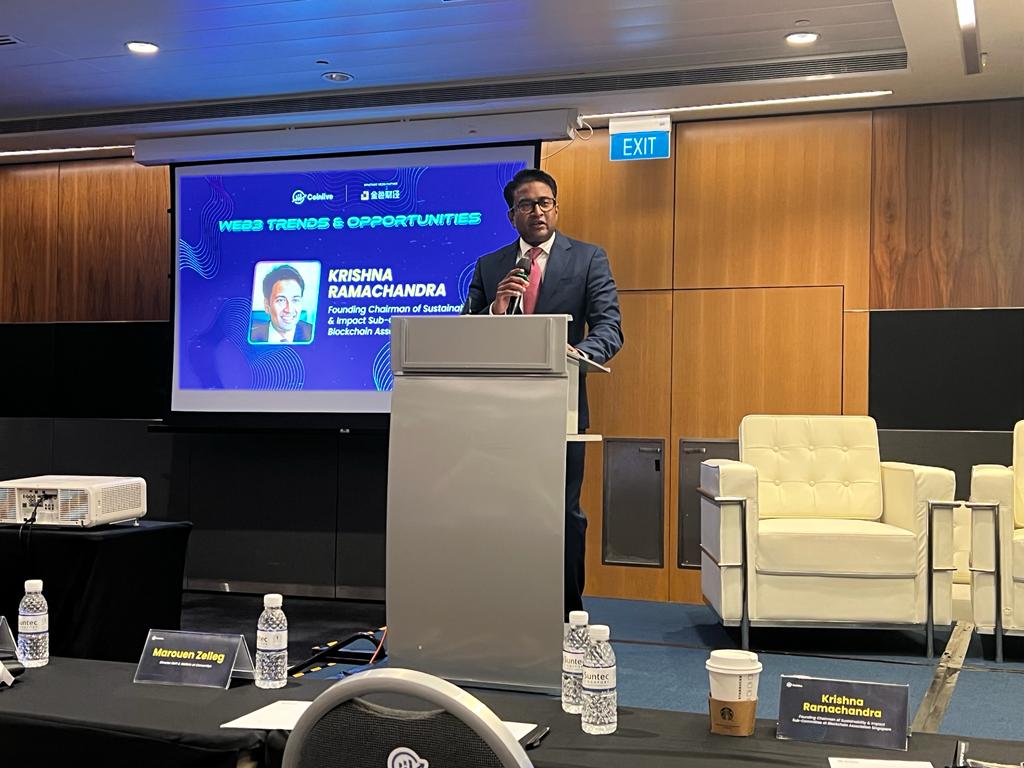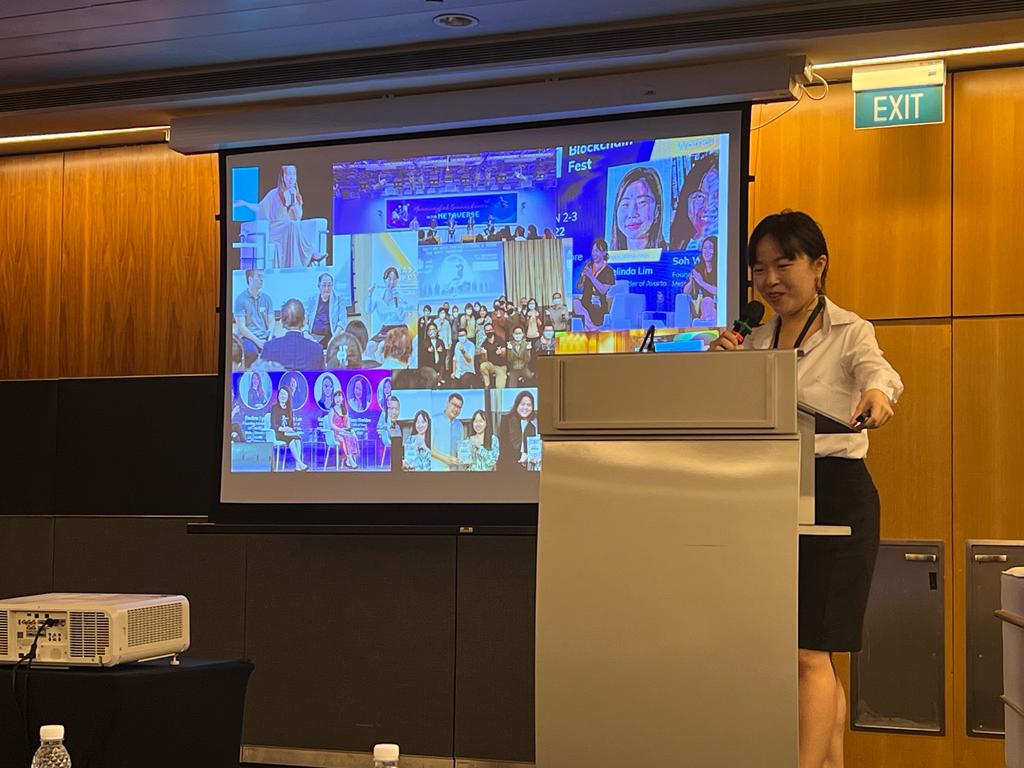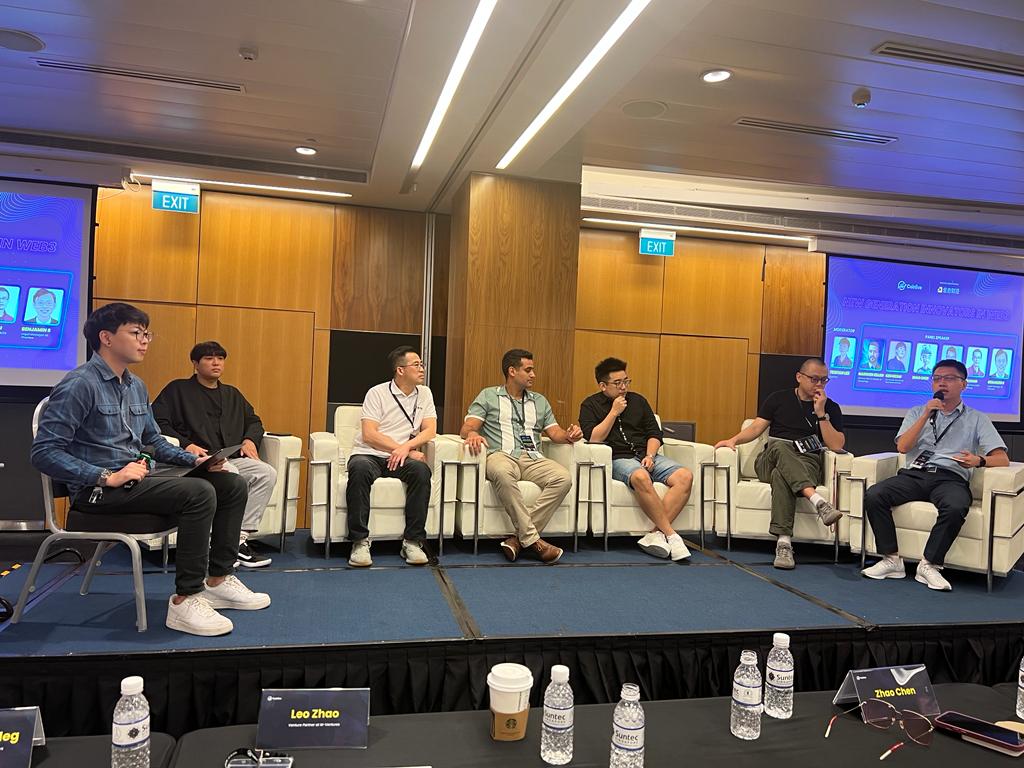Web3 Trends & Opportunities: Coinlive’s Very First Grand-Scale Summit
Web3 Trends & Opportunities ─ The Web3 Transformation: What Awaits Us in the Future?
To end 2022 with a bang, Coinlive hosted its very own, as well as its very first grand-scale summit, at Suntec Convention & Exhibition Centre on 22 December. The full-day event featured keynote speeches by industry experts, insightful roundtable discussions, and a project pitch by a National University of Singapore (NUS) student. Like-minded individuals from all walks of life were present at the event to connect and gain valuable insights and key takeaways on Web3’s trends and opportunities, as well as what the future holds for it.
Web3 Trends & Opportunities ─ The Web3 Transformation: What Awaits Us in the Future? (Web3 and Artificial Intelligence (AI): Powering Tokenisation and Sustainability with Decentralised Technologies)

The very first speaker, Krishna Ramachandra, Founding Chairman of Sustainability & Impact Sub-Committee at Blockchain Association Singapore (BAS), as well as Founder of Digital Insights Ventures, kicks off the event with the first keynote speech touching on “Web3 and Artificial Intelligence (AI): Powering Tokenisation and Sustainability with Decentralised Technologies.”
He touched on some of the core principles that Digital Insights adopts which are interaction (user experience and exchange of data), interoperability (different communities and systems [C/S] work together and efficiency via shared resources and technology), integration (combination of different C/S and forming a collective community), and interlinked (ability to navigate seamlessly between related systems and co-dependency between C/S), and he likened it to their laws of engagement and said that these grounding principles are good to have.
“At the end of the day, you got to listen to what the community wants. If they ask for convenience, it is convenience - decentralisation. As much as you would like to beat the drum for the decentralisation movement, you still kind of have to listen to what the community wants. And I think this is sometimes missed on projects,” Krishna mentioned. He said the distinction of Web3 and Web3.0 are lost on a lot of people, and they are used interchangeably. “Web3.0 actually refers to the purest standpoint of having blockchain be the driver of preserving privacy and also giving sovereignty to your identity and data.
Meaning you will be able to control how your data is used; you would be able to monetise it,” he continued.
He expressed that the rules of engagement have to really take into account, sustainability. Krishna concluded his speech by stating that if people in positions of influence or power do not help the sustainability narrative, the true potential of Web3 would not be seen, which would be quite remarkable in the way it allows for the creator economy to flourish.
Web3 Trends & Opportunities ─ The Web3 Transformation: What Awaits Us in the Future? (The Metaverse & Asia: A New Era in Storytelling)

Soh Wan Wei, CEO at IKIGUIDE Metaverse Collective, took to the stage with her keynote speech titled “The Metaverse & Asia: A New Era in Storytelling”. She shared that the common thoughts of the metaverse is that is it Facebook or a game or a virtual world, and explained that you do not need to be afraid when you see words like AR, VR, XR, or MR as they are just technologies by which the metaverse can be executed. She listed down the three fundamentals in the metaverse:
1) Needs to be immersive: you are aware and conscious that you are in another reality
2) Interactive: there are activities to be done on the metaverse; it is not aimless
3) Social: community is at the core of every single metaverse we see
Wan Wei pointed out that she encountered questions like is the metaverse just a hype or is it the future and is here to stay. She went on to showcase some case studies she spotted on her recent trip to Japan, one of which is a project by a café called “Tree” by “Naked” in Yoyogi Park ─ diners don a VR headset for their fine dining experience; when one eats, there will be lights, sounds, and sensations around them to enhance and help you understand the story behind the food (it combines technology art such as VR and projection mapping with cuisine).
Another example is SK-II and the metaverse; “SK-II is a very progressive and they actually have their own SK-II city two years ago featuring Shibuya Crossing with six clips and films…instead of watching the movie just like that, you go into the metaverse and your avatar watches the movie. All these clips are actually in an avatar version,” she described.
The last example she showcased was of TeamLab: there is a space in Roppongi where you can step into the sauna to enjoy the metaverse sensation, and the idea is to alternate between extreme hot and cold in terms of sensation to tell you a story about life and philosophy.
“Asia will unveil a new era in storytelling through the metaverse,” she concluded.
Web3 Trends & Opportunities ─ New Generation Innovators in Web3 (Startups, VCs, and Grooming the Next Generation of Innovators)

Before the event came to a conclusion, there was a last roundtable discussion titled “Startups, VCs, and Grooming the Next Generation of Innovators” and featured (from left to right) co-founder and CEO at AsiaTokenFund Group Ken Nizam, Director of UKISS Tech Ben Chan, Director DeFi & Wallets at ConsenSys Marouen Zelleg, Zhao Chen, Legal Manager at Phemex Benjamin S., and Assistant Professor at the School of Computer Science And Engineering, Nanyang Technological University (NTU) Li Yi.
Before the event came to a conclusion, there was a last roundtable discussion titled “Startups, VCs, and Grooming the Next Generation of Innovators” and featured (from left to right) co-founder and CEO at AsiaTokenFund Group Ken Nizam, Director of UKISS Tech Ben Chan, Director DeFi & Wallets at ConsenSys Marouen Zelleg, Zhao Chen, Legal Manager at Phemex Benjamin S., and Assistant Professor at the School of Computer Science And Engineering, Nanyang Technological University (NTU) Li Yi.
The roundtable discussion commenced with the rounding up of the project pitched by NUS student Han Wei Lun ─ all of them had varying opinions about what can be improved on but in general, there were good feedback. Prof. Li Yi verbalised that he was unsure if the model Wei Lun is building is decentralised or centralised, and pointed out in terms of security concern, how can the model be more robust and how to make it so that it can withstand attacks. Benjamin praised the intention, execution, and feasibility, and stated that to improve the model, an education segment can be added in order to educate the users on how to use it, and how to read and understand the data. “It is very prevalent that people think that security in the crypto space is politically correct to talk about. Nobody seems to be noticing that the business model for security companies is pretty bad. You have to admit that it is really hard to charge your users for your services and products,” Zhao Chen shared and one of the major suggestion he had for the project was to think of how to approach the market instead of just building then product itself. To Marouen, the mission statement was spot-on and there are many things to look forward to in this project; it would be good to take a look at other projects in the market as well. Ben mentioned that they can improve the overall security of the project by working with MetaMask (for example) to give more information about the contracts and awarded address so as to give users warning if they want to sign or not. Ken concurred as well that the idea and intention were good; besides the technical aspect, it is good to understand how the hackers work/think and their modus operandi.
When it comes to why they think innovation in the Web3 space is important, Ken is a firm and strong believer of innovation and said that it should not be tied together with trend; Ben explained that Web3 have to rely on innovation to thrive and attract more users, that 99% of internet users are not in Web3 and only enter to speculate; Marouen said to look at the key properties of Web3 and blockchain, then decide if you need to model those and assemble them to create something completely different, or just look at what has been done in the Web3 space and fixed the problems like user experience, scalability, security, etc; Zhao Chen pointed out that we cannot separate innovation from the market that the market itself is the playground that you put your innovation on, going on to suggest that builders should not only build their products or companies based on the technology but to take a look at the market feedback; Benjamin expressed that Web3 is important because there is a push towards this concept called the digital economy where we want to buy goods and services, whether real or virtual, and that Web3 is a way for payments to catch up to the internet; lastly, Prof. Li Yi concluded that there is a lot of innovation happening in the finance and DeFi market, and there is a need to know how to incentivise and encourage the community to build a better software, which is by integrating Web3 into it.
On how to inspire the next generation of innovators in Web3, some felt that the next generation needs to do the groundwork, to fail, and make mistakes in order to learn and grow; some expressed that being a crypto-native person will be beneficial; also, having near and long-term visions are imperative. Another point was to expose the locals to events around the world; we need to go global and capture the world market.
Some felt that innovation will not reach a point of saturation in Web3 because innovation happens when you think outside the box and unique innovation is rarer than rare. They also brought up the point of a multitude of project duplication in the market, though it might not be a bad thing. For Ken, it is all about the user experience: no matter what product or technology you develop, the user experience and interface have to be easy enough so you can onboard millions. Zhao Chen pointed out that making it simple is not the only solution though it is good for customer acquisition.
When it comes to whether the attitudes/investment theses of VCs and startups have changed in the bear market compared to the bull market, projects that are forced to mature will be better than projects that just blow money. The local scene is more stringent and cautious though in the bear market, you will see good builders.
Topics
Recent comments
